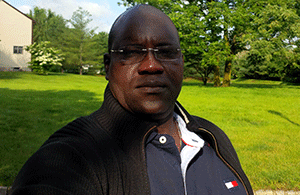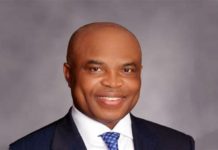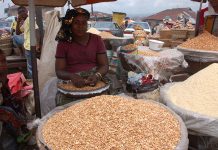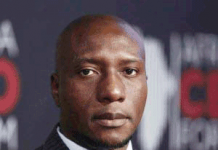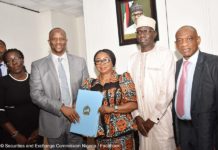Adekunle Onime, Managing Director/Chief Executive Officer of Marketing & Promotions Concepts, is the pioneer of experiential marketing in Nigeria.
From his humble entertainment marketing and promotion background, he dreamt of what has turned into one of the most sought after and competitive marketing communication platforms.

He laments, however, that multiple taxation, poor power supply, and a lack of full appreciation by corporate organisations hinder the growth of the sector.
Onime, who bares his mind to Senior Correspondent, GODDIE OFOSE, urges the new federal administration to deploy brand activation to shore up the country’s reputation in the international community.
How it all began
It started a long time ago, right from my secondary school days. I have been involved in show business, and also in the university I did lots of show business. After school, I worked with Ras Kimono, and after Kimono I worked with DP Lekki, organisers of Lekki Sound Splash.
Towards the end of my stint with DP Lekki, which was in 1994, I had an idea. Interestingly, on the day this idea flew into my head I was with Ali Baba and Ajelogo. I said, ‘look, this idea just flew into my head’, and they said I should go and give it a shot if it was going to work.
Quite frankly, I didn’t know it was called experiential marketing. It was just an idea that I had to promote goods and brands in the market.
I went back and started putting my acts and proposals together and started talking to corporate organisations. You will be shocked at the kind of responses I got; they were very negative and most said it wasn’t going to work in Nigeria.
I had friends in Coca-Cola; and also the likes of Seni Adetu, the immediate past Managing Director of Guinness Nigeria; Reuben Onwubiko, Marketing Director for GSK; Bayo Omoleye; JoJo Dauda; and a whole lot of them like that.
It was more like I was giving them stress, and they were like ‘just take and go and do this thing let us have peace of mind’.
We called it market jam then. We started going from one market to another promoting Coca-Cola products. That was how the whole thing started in 1994 to 1995.
In 1996, I was right inside this market in Abule Egba, Lagos having this same activation and promoting Coca-Cola products. Then we were doing it only on Saturdays.
I saw a group of white men who drove in. I didn’t know who they were; I thought they were Coca-Cola officials that came to see what we were doing.
After the activation we got talking and apparently they were South Africans. They wanted to come and set up an experiential marketing firm in Nigeria and everywhere they went, they were told to come and see me because I was the only one doing it on a local small scale.
They said they would like to see me, they came to my activation, and then saw it. We arranged for a meeting, and that was how they convinced me to team up with them and set up the first experiential marketing firm in Nigeria.
That was how the whole thing started.
Combining entertainment and business
Once I left Kimono, I went to work at DP Lekki; and my roles and responsibility were also marketing, organising, and promoting Lekki Sound Splash. So I had a little bit of marketing background.
I had a few contacts in the marketing business in the course of marketing Lekki Sound Splash. When the idea came I was a greenhorn in the marketing business as it were.
But I already had stints in trying to market Lekki Sound Splash and other products we had on our billing at that time.
Experiences pre-1996
It was extremely exciting, it was beautiful, we were received with warmth and excitement. At that time everybody wanted to be a part of it, even the likes of Kenny Ogungbe and D1 were part of this activation. Denis Obi was part of it.
We had a Ray Power crew that was a part of this whole thing and it was reporting live from activation points on Ray Power FM. It was a wonderful and beautiful experience of experiential marketing in my life.
First of all you know what it means to have an idea and then your idea comes to live and even goes beyond your imagination. It was the most beautiful moment of my life.
Then people wanted to know where next we were going because they wanted to be a part of it.
You got a career then…?
It didn’t look to be like it then, it wasn’t a career but something I was enjoying. However, the moment it started becoming serious I just realised that career was here; this is where the future is.
Corporate acceptance post-1996
We were too busy trying to concentrate on the success of the job at hand, so professionalism was in the course of training.
We went through very rigorous training trying to recruit the first set of people whom we used travelling from coast to coast, East to South, West to North.
I happen to be one of the few Nigerians who has travelled the 774 local governments in this country going from one town to another to promote different brands. It was pretty difficult but it was fun. It was exciting and beautiful.
It gave one an opportunity to know so many things about Nigeria. I know the cultures of the people and I was able to identify with so many people.
Coping with job volume
We didn’t have challenges because we had room for expunction. We launched in 1997; by the end of 1997 we moved from one rig to four rigs, and by the end of 1998 we were moving to six rigs before we disengaged in 1999.
The company’s name was Group Africa, now called EXP Nigeria.
Brand that gave birth to industry
We had Nestle. We had a number of brands from the rig, like Kiwi, Society for Family Health, Maclean. We had about 10 brands, and then of course Indomie.
We took those 10 brands for the first year, and then the following year it became a bang and everybody wanted to join the bang.
We had to move from one rig to another rig, which meant that we had 20 brands. By the end of that year we had to move from two rigs to four rigs.
Industry transformation
In 1994, I started running around with that idea everybody said wasn’t going to work. Quite frankly a lot of people said I was mad.
The interesting thing right now is that we have so many ‘mad men’ on the streets of Nigeria, and that gives me a lot of joy, it makes me realise that this idea that I had in 1994 is now a money making machine for a number of people.
You find a situation that it is so exciting that even brand managers are resigning to start their own experiential marketing agencies. A lot of people do not know the depth of what we are doing because what we do basically is take a lot of armed robbers off the street.
Let’s do a computation of the number of agencies that are around; none of them has fewer than 100 people working for them; be it proper staff or casual staff, promoters or brand ambassadors.
If these agencies were not available, tell me what these people that we are talking about will be doing. A lot of them would have taken to crimes like picking pocket, armed robbery, and so on.
Expectations of innovativeness
We have evolved from dancing on the street into creating a different avalanche of opportunities in terms of innovation. We do a lot of data gathering, research. Our research information we gather is first hand.
We are able to give clients first hand information on what their products are doing and how the products are doing in the market.
Tracking experiential marketing
Brand activation is easily monitored compared with other formats because it is instant. There are no two ways about it.
Limitations
Let me explain it to you this way. You have an activation running in Ojuwoye market for instance and you say it is limited. But what you are doing is visible to everybody at Ojuwoye market at that particular time.
You probably will not say you are able to reach 3,000 people but you can safely say that everybody that was in that market at that point in time heard, or saw, or through word of mouth knew that the activation ran about a particular brand.
As we are seated here now the TV is on and whatever advert that is running on TV is useless. How many people have access to power their generator to be able to watch the commercials running on television?
But for the activation that I run in any town, especially in the rural areas, everybody knows about it, it’s very clear.
Today’s reality
Most definitely, the way to go in marketing is experiential. The future of marketing is experiential.
Experiential taking marketing budget
The problem we have is that even a lot of brands have not accepted experiential, so our budget is very limited. Prior to now we didn’t even have a budget. We were taking out of media.
Now brands and companies that have realised that the way to go is experiential carve a little bit of budget for experiential.
Impact on brands
The impact of experiential on a brand is instant. It is easy for you to know and identify with a brand because we create a synergy between the user of a product and the producer of the product.
We create an experience and a link. You cannot find that in the mass media. Have you ever laughed in the course of hearing an advert on radio or watching it on TV?
But you go and watch our activations and you see people clapping to what we are doing. They are happy, they are dancing and enjoying themselves. The result is spontaneous. We change passive consumers to active consumers.
Using brand activation to prop up national image
Are you aware of the experiential bits that candidates and parties used during the last elections? We did a lot of work for some candidates.
We as an agency chose not to work for the parties, we worked for individuals and it was really awesome.
Better effect than radio and TV?
Not really. The marketing mix has to be very perfect; I will not say here that just with experiential we are able to deliver.
The marketing mix has to be very well articulated and put together. Once the mix is properly put together then life becomes easy.
Success story
We have not recorded any success as an association, we are still trying to find our feet and we are still trying to get acceptability from the stakeholders of the industry. It’s a gradual process.
Yes, we are just a year and a half or maybe two years old as an association but I think if you guys give us a little bit of time to get our act together it will be easy for us to say “yes, okay we are able to regulate the industry”.
I am not the president of the association so I wouldn’t want to be quoted. I know that we are still trying to organise ourselves properly before we can start regulating the industry.
We get recognition from APCON (Advertising Practitioners Council of Nigeria), Triple N, and all of that.
Factors that hinder growth
It is the same problem we have spoken about. First, we need the government to recognise us that we are here and we provide gainful employment for people.
We need the likes of Lagos Advertisement and Signage Agency (LASA) that has been replicated all over the country to take it easy with us.
The kind of charges we get from them scare away clients that will like to go experiential. We face a whole lot of problems from area boys, police, and road safety (Federal Road Safety Commission).
They know what you are doing, they see the set up and everything, yet they slam you on the road.
Effect of multiple taxation
Yes, it’s all over the place. You will pay local government, you will pay state, and also federal. It is crazy.
Impact on economy
If you take out experiential from the system, it will affect the economy massively because people like me will take to armed robbery.
For people we have provided gainful employment and who are doing very well in this endeavour, you just wake up one morning and say you are pushing us into extinction?
What do you want us to do? Where do we start from, especially for people who, right from school, have got into experiential and have evolved and grown up the ladder?
Mr Experiential Marketing?
Me? No. I don’t think I should be called Mr Experiential Marketing. It was an idea God gave me and I have done my bit.
It is fair to say I pioneered the industry but not to say I am Mr Experiential Marketing.
So far
It has been very fulfilling and also very challenging. But I think on the long run it has been worth the while.
Managing artistes
In our time, what we were doing then we were doing from the depth of our heart, there was no money involved.
There was nobody at that time who was making any money, but because we loved what we were doing, we were doing it with passion.
There is a whole lot of transformation right now because of the kind of money involved. They are making mega bucks right now unlike during our time. Some, yes; and some, capital no.

